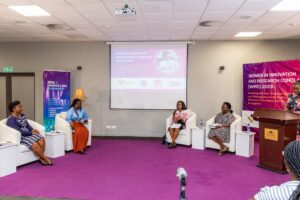Experts have called for deliberate investment and development of women-specific national policies to ensure women thrive in the science, research and innovation space.
Speaking at the recently held Women in Innovation and Research Conclave (WIRC), on the theme ‘Breaking barriers, empowering women and driving ownership: putting women at the core of the research and innovation ecosystem’, experts came to the consensus that apart from investing more resources, targetted interventions are needed to attract women into the science and innovation space.
They underlined the imperative to challenge traditional norms, dismantle barriers and place women at the forefront of these vital domains, as doing so will recognise the invaluable contributions they make and the urgent need to ensure their equal representation and participation.
Associate Professor at the Chemistry Department – Kwame Nkrumah University of Science and Technology (KNUST), Marian Asantewah Nkansah, explained that though the country has a general policy on science, there is need for a national women-specific policy to minimise disparity and enable women to succeed in the space; especially when unconscious stereotypes persist.

“As a country, we do not have many policies that are geared toward making women in science and technology innovation thrive. There are general policies on science, but as for women-specific we do not have them.
“I recommend that we have women-specific policies so the few women who are in these spaces will find it a safe environment to thrive; and then young ones will also see the need to come in. I also recommend structured mentorship for the younger ones,” she said.
The Chief Executive Officer (CEO) of Heritors Lab Limited, Derrydean Dadzie, meanwhile noted that gender disparity and underrepresentation of women is not only a matter of social justice but also a missed opportunity for unlocking the full potential of innovation in the Ghanaian research and innovation community.
He is confident that by breaking down barriers, providing equal opportunities and empowering women, the country will harness the diverse perspectives, creativity and talent which are essential for driving transformative change.
“The research and innovation ecosystem plays a crucial role in shaping our future. It is a catalyst for progress, driving economic growth and addressing societal challenges. We believe that if we listen, understand and take concrete steps to address the challenges of women in the space, we can normalise and mainstream women in leadership roles. This will inspire other young girls to venture into research and innovation,” he said.
“A 2021 United Nations Educational, Scientific and Cultural Organisation (UNESCO) report has it that the share of female researchers as a percentage of total researchers in Ghana is 26.1 percent – below the global average of 33.8 percent. The scariest part of that research is only 9.3 percent of women are in natural sciences and 6.8 percent in engineering and technology fields. As a result, there is a call for increased investments in the field of science alongside efforts toward bridging the gender gap,” he added.

Deputy Director-General at the Council for Scientific and Industrial Research (CSIR), Prof. Marian Dorcas Quain, also noted that the role of women is crucial as the country pushes for import substitution – because they are to a large extent at the centre of what the family consumes and uses, hence their contribution in the innovation space cannot be underestimated.
“Today’s engagement has shown us that there is a lot being done by women, and we have to be more deliberate to get them into research innovation and development,” she added.
In collaboration with the Research and Innovation Systems for Africa (RISA) Fund, Heritors Labs, and CSIR, and supported by the UK Foreign, Commonwealth and Development Office (FCDO), the 2023 ‘Women in Innovation and Research Conference’ was organized – demonstrating their commitment to empowering women and fostering gender equality in these domains.
The conference covers a range of themes: including leadership and career development; bridging the gender gap in science, technology, engineering and mathematics (STEM) fields; promoting diversity and inclusion; overcoming workplace challenges and biases; empowering women entrepreneurs and innovators; encouraging collaboration; and showcasing success stories and institutional initiatives.










